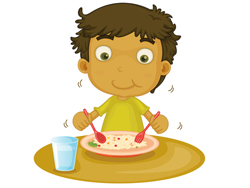Food For Thought: Top 10 Super Foods For Better Learning

We know eating fruits, vegetables, fish, nuts and whole grains are good for our health, but did you know they are also good for learning? Whether it is the antioxidants in berries, the fibre of apples, the phytochemicals in sweet potatoes, lycopene rich tomatoes, choline in eggs, or the unsaturated fats of an avocado, what you eat is important for healthy brain development, cognitive learning and memory.
Add in some of these Super Foods for a super school year and better learning.
Berries
Include berries such as vitamins and antioxidants, they ward off damage caused by free radicals and may improve the cognitive function of the brain, improving memory and motor skills.
Eggs
Just one egg contains an amazing amount of nutrition. With 6 grams of protein per egg and more than a dozen vitamins and minerals including riboflavin, B12 and folate, they are a rich super food. Eggs are also an excellent source of choline, an important nutrient for brain development.
Dark Leafy Greens – Spinach & Kale
Greens such as spinach and kale pack an immune boosting punch with their vitamin A and C. The vitamin B-12 and folate in spinach improves brain health and the maintenance of cognitive functioning, including memory. Kale is rich in manganese, a trace mineral that helps synthesize fatty acids critical to healthy brain function. Try Kale chips, and spinach brownies to give kids a nutrient boost in foods they like!
Salmon, Tuna, and Mackerel
These fatty fish are full of essential omega-3 fatty acids. Omega 3 rich fish such as salmon, tuna, and mackerel are important for brain development, heart health and reducing inflammation. Your brain is comprised of approximately 60% fat, and by including Omega 3 fatty fish such as salmon and tuna at dinner you are providing the essential fats your brain requires for optimal functioning. Try some kid friendly fish meals at least 2 times per week to get the DHA/EPA benefits of Omega 3 fats.
Grape Juice from Concord Grapes
Grape juice may be a smarter beverage choice. Research shows that the polyphenols from concord grapes can improve the communication between brain cells. The antioxidant rich grape juice improves short term memory and motor skills.
Whole Grains and Brown Rice
A simple switch to brown rice, whole wheat pasta’s and whole grain breads can increase brain health. Filled with vitamins and magnesium, important to cognitive health, whole grains contain B vitamins including folate and B12 that increase memory and regulate energy levels to keep kids alert in class. Add in fibre rich oats and quinoa to get the benefits of more fibre and added protein in your casseroles, baking and morning hot cereal.
Beans
A nutrient-rich food, beans contain protein, complex carbohydrates, fiber, antioxidants, iron and important B-Complex vitamins. Try adding beans to a wrap, soup, pasta sauce or chili. Bean dips are a great way to spice up raw veggies for an afterschool snack.
Puree chickpeas, lentils or white kidney beans with some garlic, lemon and extra virgin olive oil for a brain healthy dip for snacks.
Chocolate
Warm up with hot chocolate to help your brain! Dark chocolate contains more antioxidants than blueberries and natural cocoa rates higher than raspberries and blackberries for these key nutrients. The antioxidants in chocolate protect brain cells from damaging free radicals and improve cognitive function.
Nuts – Almonds and Walnuts
Walnuts are the top nut for brain health with their high concentration of DHA, an Omega-3 fatty acid shown to improve cognitive performance. Just a ¼ cup of walnuts provides almost 100% the recommended daily intake of DHA. Almonds are high in Vitamin E, also shown to improve memory function and make a great mid day snack.
Olive Oil
Olive oil contains brain friendly monounsaturated fats that can lower LDL (bad) cholesterol. Extra Virgin Olive oil is also rich in potent antioxidants called polyphenols that prevent damage to cells in the brain from free radicals.
Eating whole foods will ensure your child has a nutrient dense, fibre rich diet that maintains consistent blood sugar levels and helps them stay focused and avoid the highs and lows from sugary processed foods. If you have picky eaters in your bunch, taking vitamins to supplement their diet ensures they are still getting essential nutrients. Incorporate antioxidant rich berries, brain boosting omega 3 fish, satisfying protein in eggs, beans and oats, and fibre and vitamin B rich grains to provide your young scholars with a great school year.
Deb Lowther is a mother of 3 young daughters who, when not running after the kids, is running in the trails! She blogs about Raising Healthy Kids and ensures her own have fun while eating healthy & staying active. To read more articles you can visit her websites www.iron-kids.com & www.adultgummies.com or visit her on Facebook at IronKids.Health and Adult Essentials.



